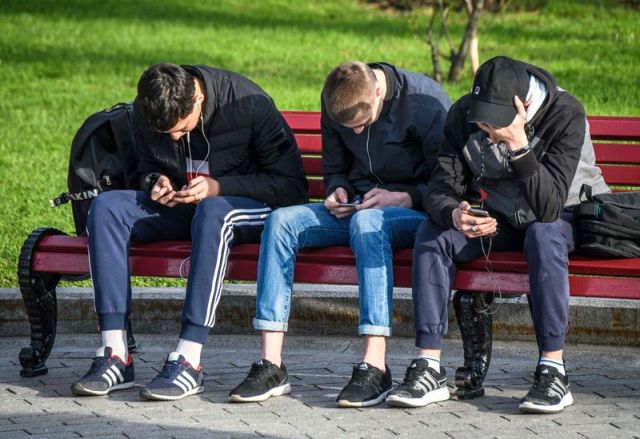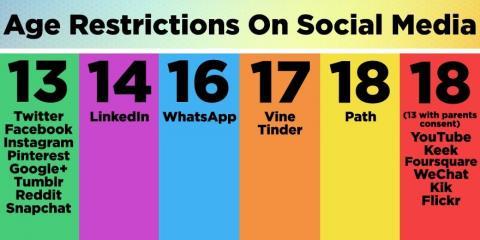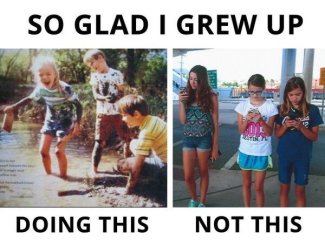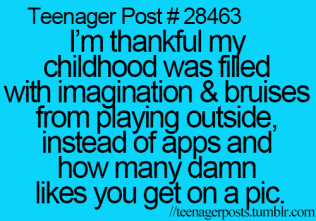Media has been historically shown to influence attitudes, behaviors and knowledge of children. Peer influence as measured by social media likes and dislikes can become a strong stimulus for unhealthy behavior in children! Kids are looking for attention and are succeeding by sharing attention seeking posts featuring risky behavior; done for social acceptance.

Erin, Brooke and Daniel debated for the, ‘disagree’ side, while Melinda, Allysa and I debated for the ‘agree’ side. After hearing the ‘disagree’ side of arguments, I have to say that I still side with the ‘agree’ side. Social media (SM) is a great risk to young children, so in that respect, it is ruining childhood!
Recently a survey showed 20% of teens have sent or posted nude or semi-nude photos or videos of themselves, called ‘Sexting’! If information is shared without consent, it is prosecuted under the criminal code of Canada (Bill C-13). If a child posts a provocative picture, again, consequences can be life-long.
It’s been scientifically proven that children have an under-developed pre-frontal cortex, a part of the brain that moderates social behavior and decision-making. Social media was not designed for children!
Risk taking behaviors such as the ‘tide-pod challenge’ or ‘blue whale game’ are truly frightening!
My fourteen year old son thought that the tide-pod challenge was a safe thing to do because he ‘saw it on YouTube’.  Thank goodness I was able to talk to him about it before he actually tried it! Whew! My son used to watch another YouTube channel that featured kids microwaving various objects to destroy them. Again, I was able to catch my son before he did any damage, but what about other kids?
Thank goodness I was able to talk to him about it before he actually tried it! Whew! My son used to watch another YouTube channel that featured kids microwaving various objects to destroy them. Again, I was able to catch my son before he did any damage, but what about other kids?

The collective, continuing record of a person’s web activity is called a, ‘digital footprint’. Risks of improper social media use include privacy violations as well as possible sharing of too much information, or posting false information about themselves or others. This could include joining social media sites such as Twitter or Facebook before the age of 13. If abused, children’s digital footprints may be forever damaged.
Kids always think that bad things won’t happen to them such as their information being misused, or, ‘what goes online stays online’ if posting risky pictures or information/ bad comments. Internet misuse may make children targets for fraudsters, cyberbullying, or pedophiles.
Most of the points raised by the, ‘disagree’ debate team was in reference to social media use by teens. However, teens may be better able to navigate the internet as well as have better sense of what not to post when compared to young children. That is why there are minimum age requirements for SM sites such as Facebook in the first place.

Daniel commented that ‘I did stupid things as a kid and I didn’t have social media’. I’d like to say that first of all, thank goodness we didn’t have social media, or I’d still be forced to relive those crazy things I did as a kid! And perhaps those things would be detrimental to my professional career! Secondly, I feel that my team’s argument was not that social media ‘causes’ stupid behavior, rather it ‘potentiates’ risky behavior that otherwise wouldn’t have happened.
When I was a kid, my world consisted of my neighborhood and family, now, kids exist alongside the whole world as observers! While this can be positive for learning, I don’t agree that SM improves childhood life experiences. Technology may assist with learning and teaching children, but social media doesn’t benefit young children. SM may be a benefit for older pre-teens and teens, but that population can use self-control and exhibit mature decision making abilities.


As educators, we need to inform young children as to SM dangers, and encourage healthier forms of entertainment, such as playing outside at the neighborhood park. Social media amplifies some of the effects on young people’s natural tendency to risk taking, fueled by notions fame or instant popularity. Permanent negative digital footprints are being developed as a result of posting risky information.


Lori, I loved your blog this week. I am a new mom and I frequently have conversations with my husband about all the worries I have of raising our daughter. It is comforting to know that you are having success in navigating this complex time of parenting with your son, and it speaks to the openness and conversations that must be had with both our children and/or students to ensure they are using SM in a safe way! I also agree with this weeks topic because I simply believe we aren’t at the point where 100% of children are not being negatively impacted by SM. Great job!
LikeLike
Thanks for your comment, Kristen. That’s a great way to say it, “100% of children are not negatively impacted”! Therefore, thats enough reason for more proactive and preventative education for children about risks of SM.
LikeLike
Thanks for your post Lori! I totally agree that social media is inappropriate for young children! Although teens are older, I also think that they need a lot of adult guidance and supervision in terms of what to post and how to deal with cyber bullying and peer pressure. What a world this generation is growing up in, so many different challenges to face.
LikeLike
Thanks for your comment, Esther.
LikeLike
Pingback: IS SOCIAL MEDIA REALLY RUINING CHILDHOOD???? | SAPNA'S BLOG
Hi Lori, I must say I was originally on the agree side coming into this debate, but was swayed to the disagree side in the end. However, one piece of research that your team included that I found particularly interesting was the fact that “children have an under-developed pre-frontal cortex, a part of the brain that moderates social behavior and decision-making.” I think this is definitely going to make our jobs as teachers and parents a lot more difficult. I’ve seen the impact of this in my career – students learn about digital citizenship and have opportunities to practice responsible use, and then turn around shortly after and become involved in cyberbullying situations. How do we help our kids make better decisions in those moments, when they may not have the capacity/brain development to do so? Really thought-provoking stuff! Thanks for sharing!
LikeLiked by 1 person
The biology will hopefully help us to understand behavior, as well as help to find ways to prevent the negatives associated with misuse of technology. I remember climbing trees when I was young, but didn’t think I might fall out and break my neck. Today, technology and social media are the mediums that kids are taking risks in. Thanks so much for your comment, Jana!
LikeLiked by 1 person